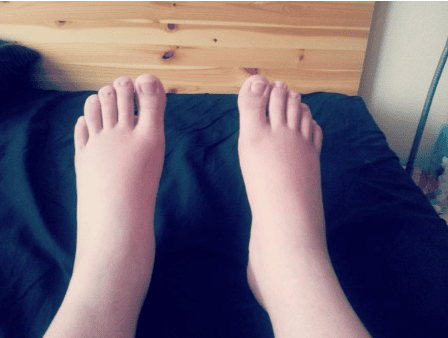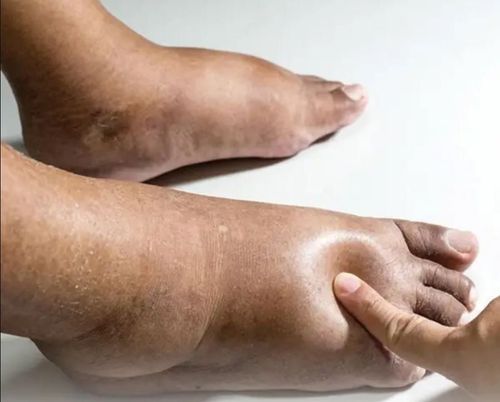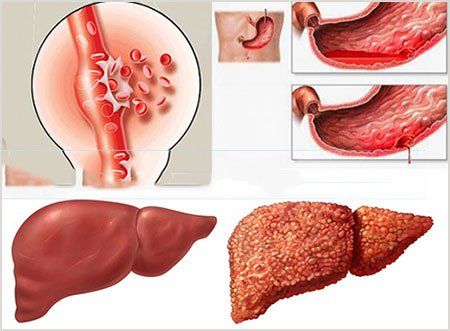This is an automatically translated article.
Edema can be a symptom of many diseases. Edema can appear on any part of the body, however, the most common sites of swelling are under eye bags, hands, arms, feet, ankles and legs.
1. What is edema?
Edema is swelling caused by excess fluid in the body and trapped between tissues. This amount of fluid is caused by damaged capillaries, causing leakage and release of fluid into the surrounding tissues - the space between the cells. Edema can appear on any part of the body, however, the most common sites of swelling are under eye bags, hands, arms, feet, ankles and legs.
Edema mainly occurs in the elderly and pregnant women, however anyone can develop edema.
Trắc nghiệm: Làm thế nào để bảo vệ lá gan khỏe mạnh?
Làm test trắc nghiệm kiểm tra hiểu biết về gan có thể giúp bạn nhận thức rõ vai trò quan trọng của gan, từ đó có các biện pháp bảo vệ gan để phòng ngừa bệnh tật.2. Symptoms of edema
Depending on the cause of the edema and the location of the edema, the body will have different edema symptoms, in which, swelling and pain are the two main and common manifestations. Here are some signs that the body is suffering from edema. edema :The skin is swollen, taut and lighter in color. Gently press the skin to see that the skin is indented, it takes a few seconds to return to its original state. Swelling in the eyes, face, or ankles.
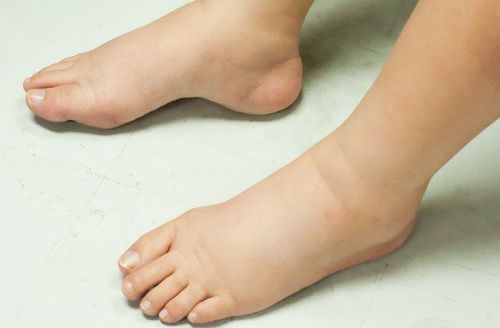
Mắt cá chân bị sưng
Pain in joints and all over the body. Weight gain or loss Observe the veins in your arms and neck to be more visible and fuller than usual. People with edema have a higher-than-normal heart rate and blood pressure. Headache, visual disturbances, forgetfulness. Abdominal pain, nausea, vomiting, change in bowel habits.
3. Causes of body edema
Edema can be caused by circulatory problems, infections, tissue death, malnutrition, kidney disease, body fluid overload and electrolyte problems. There are many possible causes of swelling in the body, including:
Heart failure: When one or both of the lower chambers of the heart cannot pump blood properly, blood can build up in the extremities and cause edema. Kidney disease: When the kidneys are damaged, their ability to filter and remove fluid is affected, putting pressure on the blood vessels and causing fluid to leak out. People with kidney problems may experience swelling in the eyes and feet. In particular, glomerular damage can lead to nephrotic syndrome, which lowers blood protein albumin levels and causes edema. Liver disease: Liver diseases, including cirrhosis, impair liver function and cause changes in hormone secretion, fluid-regulating substances, and decreased protein production. This causes fluid to leak out of the blood vessels into surrounding tissues. Cirrhosis also increases pressure in the veins that carry blood from the intestines, spleen, and pancreas to the liver, causing swelling from the abdominal cavity to the legs.
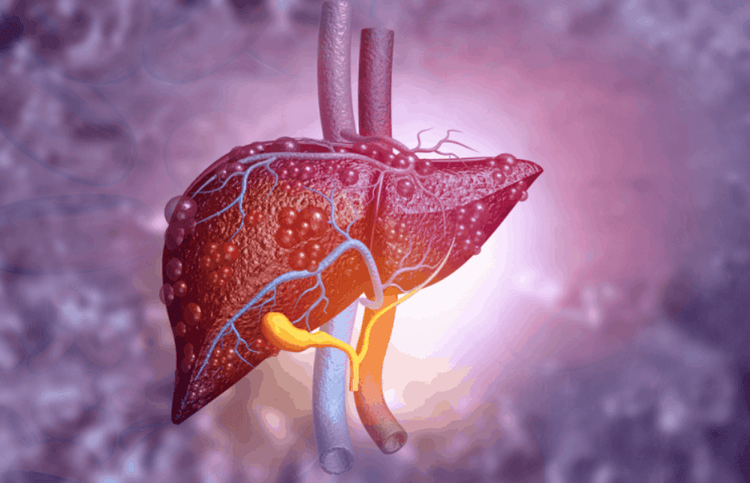
Một số bệnh lý ở gan khiến cơ thể bị phù nề
Pregnancy: During pregnancy, the body secretes hormones that stimulate sodium and water retention more than usual, causing the face, hands, feet and feet to be swollen and swollen. In addition, the enlarged uterus puts pressure on the inferior vena cava, clogging the femoral veins and leading to edema. During pregnancy, blood clots more easily and increases the risk of deep vein thrombosis causing edema. Preeclampsia due to high blood pressure during pregnancy, or high blood pressure, can also cause edema. Diet: A diet too high in salt or low in vitamins B1, B6, B5, malnutrition (protein deficiency) can increase the risk of edema. Diabetes: Complications of diabetes including cardiovascular disease, acute kidney failure, acute liver failure, protein-losing disease, and some diabetes medications can lead to diabetes. edema, swelling in the retina.
Cerebral edema: Some causes of swelling in the brain include trauma, brain tumor, stroke. Injuries to the head and tumors in the brain cause fluid to accumulate and lead to edema. Allergies: Some people are allergic or sensitive to certain foods or insects. Severe swelling of the face and skin is a sign of anaphylaxis. If swelling in the throat can cause suffocation, very life-threatening. Blood vessel blockage in extremities: Any blockage in the extremities including varicose veins, deep vein thrombosis, tumors, lymphedema in the lower legs can impede the circulation of blood. This puts pressure on the veins, causing fluid to leak and swelling in the legs. Other causes: Sitting, lying down, standing for too long, for a long time can cause edema. Burning, infection or inflammation of the tissues causes an exudative reaction in the intercellular spaces and causes generalized edema. Changes in hormone levels during perimenopause, menstruation, and menopause can all cause fluid retention and lead to swelling in the body. Or hormone-related diseases such as thyroid disease, or taking drugs that change hormone levels such as estrogen drugs also cause water accumulation, water retention, causing swelling in the whole body.

Người bệnh có bệnh lý tuyến giáp
4. How edema should you see a doctor?
If edema is accompanied by the following symptoms, the patient needs to see a doctor immediately to detect and diagnose and treat the disease promptly:
Rapid breathing, shortness of breath, difficulty breathing, chest pain: May be a sign of pulmonary edema, the patient should be treated promptly. Leg pain and swelling that won't go away after prolonged inactivity: It could be a sign of deep vein thrombosis. There are many causes of swelling in the body. Therefore, patients need to monitor and capture the symptoms of edema and visit a doctor soon if they have edema for a long time, or the edema causes shortness of breath or chest pain.
To register for examination and treatment at Vinmec International General Hospital, you can contact Vinmec Health System nationwide, or register online HERE
SEE MORE
Is swollen feet during pregnancy normal or abnormal? Things to know about leg swelling in pregnant women Reduce leg swelling in the last months of pregnancy




